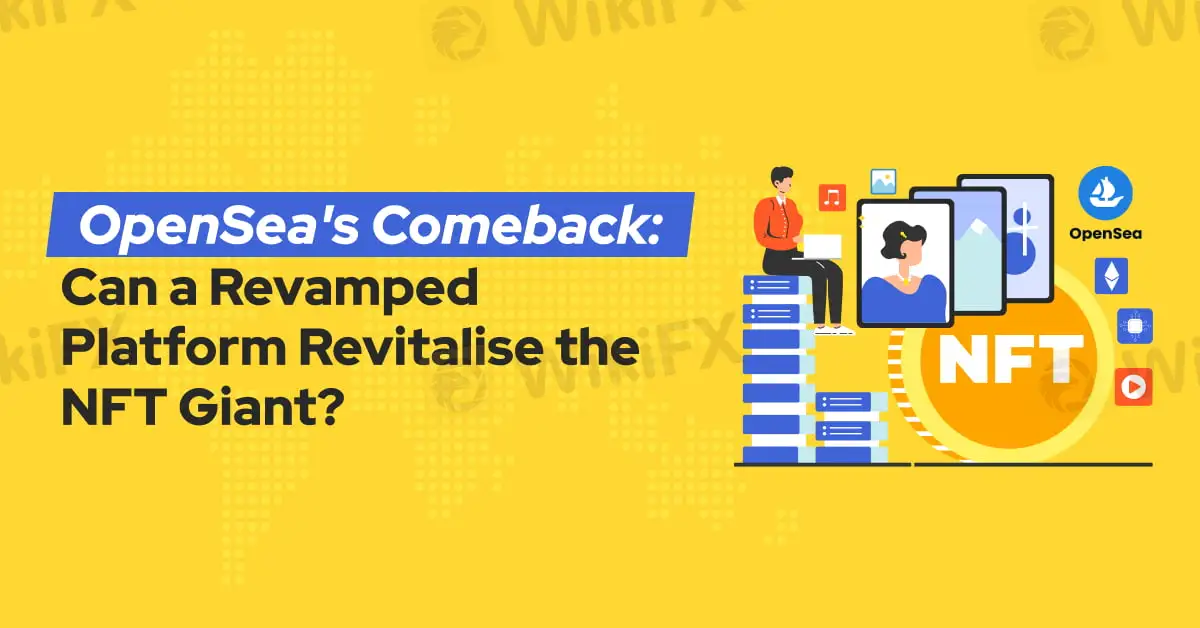简体中文
繁體中文
English
Pусский
日本語
ภาษาไทย
Tiếng Việt
Bahasa Indonesia
Español
हिन्दी
Filippiiniläinen
Français
Deutsch
Português
Türkçe
한국어
العربية
OpenSea's Come back: Can a Revamped Platform Revitalise the NFT Giant?
Abstract:OpenSea, once the dominant NFT marketplace, is launching a reimagined platform in December, aiming to reclaim its position in a market experiencing a steep drop in trading volumes.

OpenSea, once the dominant NFT marketplace, is launching a reimagined platform in December, aiming to reclaim its position in a market experiencing a steep drop in trading volumes. CEO Devin Finzer shared a preview of the revamped platform on X, hinting at the significant overhaul, stating that OpenSea has been “quietly cooking… [and] built a new OpenSea from the ground up.” This launch marks the culmination of a nearly year-long restructuring effort, following major layoffs and the start of what Finzer dubbed “OpenSea 2.0.”
In late 2022, OpenSea began losing market dominance to rival platform Blur, which drew traders with its advanced trading tools and token rewards. Blur‘s approach disrupted OpenSea’s traditional buy-and-sell model, attracting NFT traders seeking more sophisticated features. Although OpenSea has regained some market share, the platform has continued to struggle amid an overall downturn, with trading volumes recently hitting their lowest point in more than three years. At the height of early 2023, monthly trading volumes for Ethereum-based NFTs on OpenSea were around $868 million but have since dropped drastically to just $136 million in the last month.

The redesigned platform aims to address these challenges and better align with traders needs by incorporating advanced features and incentives similar to those that helped Blur gain popularity. OpenSea has already opened a waitlist for early access, suggesting that the updated platform could play a critical role in reviving interest in NFT trading.
Adding to its challenges, OpenSea received a Wells notice from the U.S. Securities and Exchange Commission (SEC) nearly two months ago, signaling the agency‘s intent to pursue enforcement actions. According to Finzer, the SEC considers that certain NFTs on OpenSea’s platform may fall under securities regulations. A Wells notice, typically a precursor to formal charges, is issued to notify a company of potential regulatory violations.
In response to the SECs move, Finzer announced that OpenSea would contest the notice. To support the NFT community, OpenSea has committed $5 million to cover legal expenses for NFT creators and developers who may face similar regulatory scrutiny. Finzer expressed concern that regulatory pressure could stifle innovation, stating that “every creator, big or small, should be able to innovate without fear.”
OpenSea‘s receipt of the notice reflects the SEC’s broader initiative to define regulatory boundaries for digital assets like NFTs. In 2023, the SEC targeted other NFT projects, including Impact Theory and Stoner Cats, alleging violations of securities laws. Both cases were settled, yet the SECs actions have fueled uncertainty in the NFT space, prompting hesitation among creators and companies. For instance, DraftKings recently decided to shut down its NFT division, attributing its closure to “recent legal developments.”
In addition to NFT-focused actions, the SEC has ramped up its scrutiny of the crypto industry overall. Earlier this year, the agency issued a Wells notice to Coinbase and began investigating other platforms like Uniswap and Robinhood for potential securities violations. As regulatory pressures mount, OpenSeas relaunch could be a critical moment for the NFT sector as it navigates both market and regulatory challenges.

Disclaimer:
The views in this article only represent the author's personal views, and do not constitute investment advice on this platform. This platform does not guarantee the accuracy, completeness and timeliness of the information in the article, and will not be liable for any loss caused by the use of or reliance on the information in the article.
Read more

Malaysia’s Crypto Landscape: Adapting Amidst Global Ambitions
The United States is intensifying its efforts to become a global cryptocurrency hub under President-elect Donald Trump. Experts believe this move could prompt countries, including Malaysia, to reassess their regulatory approaches toward digital assets.

SEC Approves Hashdex and Franklin Crypto ETFs on Nasdaq
The SEC has approved crypto index ETFs by Hashdex and Franklin Templeton, including Bitcoin and Ethereum, marking a milestone in crypto asset investment.

North Korean Hackers Steal $1.3bn in Cryptocurrency in 2024
Over $2.2bn in cryptocurrency stolen in 2024, with North Korean hackers accounting for $1.3bn. Discover how cyber theft impacts the evolving crypto landscape.

ASIC Sues Binance Australia Derivatives for Misclassifying Retail Clients
ASIC accuses Binance Australia of misclassifying 500+ retail clients as wholesale, denying key consumer protections for crypto derivatives. Penalties and reforms are underway.
WikiFX Broker
Latest News
ASIC Sues Binance Australia Derivatives for Misclassifying Retail Clients
Geopolitical Events: What They Are & Their Impact?
Top 10 Trading Indicators Every Forex Trader Should Know
WikiFX Review: Is FxPro Reliable?
Malaysian-Thai Fraud Syndicate Dismantled, Millions in Losses Reported
Trading frauds topped the list of scams in India- Report Reveals
Why Do You Feel Scared During Trade Execution?
Revolut Leads UK Neobanks in the Digital Banking Revolution
Fusion Markets: Safe Choice or Scam to Avoid?
SEC Approves Hashdex and Franklin Crypto ETFs on Nasdaq
Currency Calculator


